ABRAHAM’S LAPSE OF FAITH
Abram was in the land, and this was the place of blessing. God never told him to leave. But a famine was in the land, and I think one morning Abram pushed back the flap of his tent, looked out, and said,
“Sarai, it looks like everybody’s going to Egypt. There’s a famine, you know, and it’s getting worse. Maybe we ought to think about going down.”
And I suppose Sarai said, “Anything you want to do, Abram. I’m your wife and I’ll go with you.”
After a few days had gone by and Abram had talked to some of these travelers (probably coming from north of where he was living and bringing the news that the famine was getting worse and was moving south).
I imagine that he said to Sarai one evening, “I think we had better pack up and go to Egypt.” So Abram and Sarai start down to Egypt. Notice that God had not told him to do that.
When God had appeared to him the last time, He had said, “This is it, Abram, this is the land I am going to give you. You will be a blessing, and I am going to bless you here.”
But, you see, Abram didn’t believe God. He went down into the land of Egypt. In the Bible, Egypt is a picture of the world. You will find that all the way through. I think it is still a picture of the world. But Abram went down to Egypt.
Genesis 12:10-20 KJV
[10] And there was a famine in the land: and Abram went down into Egypt to sojourn there; for the famine was grievous in the land.
[11] And it came to pass, when he was come near to enter into Egypt, that he said unto Sarai his wife, Behold now, I know that thou art a fair woman to look upon:
[12] Therefore it shall come to pass, when the Egyptians shall see thee, that they shall say, This is his wife: and they will kill me, but they will save thee alive.
[13] Say, I pray thee, thou art my sister: that it may be well with me for thy sake; and my soul shall live because of thee.
[14] And it came to pass, that, when Abram was come into Egypt, the Egyptians beheld the woman that she was very fair.
[15] The princes also of Pharaoh saw her, and commended her before Pharaoh: and the woman was taken into Pharaoh’s house.
[16] And he entreated Abram well for her sake: and he had sheep, and oxen, and he asses, and menservants, and maidservants, and she asses, and camels.
[17] And the LORD plagued Pharaoh and his house with great plagues because of Sarai Abram’s wife.
[18] And Pharaoh called Abram, and said, What is this that thou hast done unto me? why didst thou not tell me that she was thy wife?
[19] Why saidst thou, She is my sister? so I might have taken her to me to wife: now therefore behold thy wife, take her, and go thy way.
[20] And Pharaoh commanded his men concerning him: and they sent him away, and his wife, and all that he had.
Genesis 12:10
And there was a famine in the land: and Abram went down into Egypt to sojourn there; for the famine was grievous in the land.
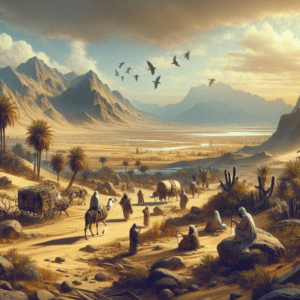 It’s amazing how the world draws Christians today. So many of them rationalize. They’ll say, “You know, brother Joyce, we’re not able to come to church on Sunday night because we have to get up and go to work Monday morning.”
It’s amazing how the world draws Christians today. So many of them rationalize. They’ll say, “You know, brother Joyce, we’re not able to come to church on Sunday night because we have to get up and go to work Monday morning.”
Well, almost everybody has to do that.
And it’s amazing that those same people can go to a banquet on a week night and sit through a long-winded program with lots of music and lots of talk and not worry about getting up for work the next morning.
It’s amazing how the world draws Christians today and how they can rationalize.
I think that if you had met Abram going down to Egypt and had said, “Wait a minute, Abram, you’re going the wrong direction—you should be staying in the land,” that Abram could have given you a very good reason.
He might have said, “Look, my sheep are getting pretty thin and there’s not any pasture for them. Since there’s plenty of grazing land for them down in Egypt, we’re going down there.”
And that’s where they went. However, immediately there is a problem, and it concerns Sarai because she is a beautiful woman.
After spending some time in the land God has promised to his offspring, Abram and his large company are forced to leave Canaan.
The land of the Negeb, where Abram’s family has most recently been (Genesis 12:9), is dry and hilly. It was prone to famine in seasons of drought, especially before modern methods of farming came along.
A severe famine, then would most likely have forced most inhabitants of the region to travel to find resources. There simply was no food or water to support them in the Negeb.
Egypt, on the other hand, had the advantage of the flat lowlands along the Nile river. People of the surrounding regions often immigrated to Egypt hoping to survive a famine.
Abram will not be the last of the patriarchs, the fathers of Israel, to move to Egypt in a time of drought. The sons of Jacob, Abram’s grandson, will travel there to seek food and encounter their estranged brother, Joseph (Genesis 37—47).
Genesis 12:11
And it came to pass, when he was come near to enter into Egypt, that he said unto Sarai his wife, Behold now, I know that thou art a fair woman to look upon:
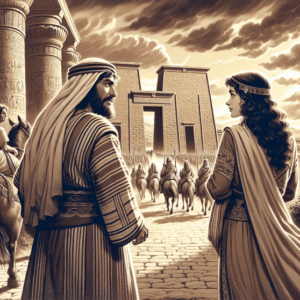 As you probably know, over along the northwest shore of the Dead Sea, ancient scrolls were found in the caves there, and they are known as the Dead Sea Scrolls.
As you probably know, over along the northwest shore of the Dead Sea, ancient scrolls were found in the caves there, and they are known as the Dead Sea Scrolls.
At first the unbelieving scholars thought that they had found something that would disprove the Bible.
But have you noticed how silent the higher critics have become?
They just don’t seem to have found anything that contradicts the Bible.
Among the scrolls was a set which couldn’t be unrolled because they were so fragile—they had been wrapped so long that they would just shatter and come to pieces.
One name could be seen, the name Lamech, so they were called part of the book of Lamech and said to be one of the apocryphal books of the Bible. Boy, how incorrect that was!
The nation Israel bought them, and in the museum the experts began to moisten and soften them until they were unrolled. The scholars found that they contained Genesis 12, 13, 14, and 15, not in the Bible text but rather an interpretation of it.
In the part that deals with chapter 12, it tells about the beauty of Sarai, actually describing her features and telling how beautiful she was. It confirms what we read of her in the Word of God.
God has promised the land of Canaan to Abram’s descendants (Genesis 12:7). However, Abram’s large company are forced to leave the land of Canaan, and to enter the land of Egypt, in order to escape a severe famine.
It is important to read verses 11–13 together to understand the full context of the scene which unfolds. For the first time, we get a glimpse of Abram’s fearfulness in spite of his belief in the promises of God.
Abram plans to tell a half-lie to the people of the land of Egypt to protect himself from harm, at his wife’s expense. Abram begins here by acknowledging to Sarai that she is a woman of great beauty.
In the next verse, he will tell her why that’s a problem. His concern seems to be that those interested in taking Sarai as their own wife might choose to kill her husband in order to make her available.
Genesis 12:12
Therefore it shall come to pass, when the Egyptians shall see thee, that they shall say, This is his wife: and they will kill me, but they will save thee alive.
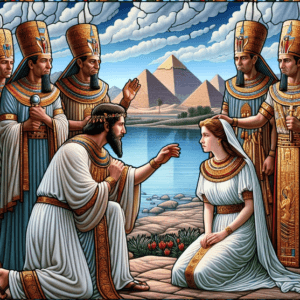 The same scroll gives a description of Abram’s exploration after God told him to “walk through the land in the length of it and in the breadth of it” (Gen. 13:17).
The same scroll gives a description of Abram’s exploration after God told him to “walk through the land in the length of it and in the breadth of it” (Gen. 13:17).
The scroll gives a first person account by Abram of his journey. It confirms what the Bible has said about the land’s beauty and fertility.
The eyewitness (whether or not it was really Abram, we do not know) certainly confirmed the Bible record.
A great many people who visit that land today can’t understand how it could be called a land of milk and honey. Well, in the Book of Deuteronomy we learn what caused the desolation that is seen there today.
But it was a glorious land in Abram’s day. However, there were periods of famine, and Abram left the land and went down to Egypt during such a time.
Forced to immigrate with his large company into Egypt to escape a famine, Abram is worried about his safety. Why? His wife Sarai is a woman of great beauty.
He is just an immigrant seeking food for his people. From Abram’s perspective, this leads to a terrifying question: what’s to keep the Egyptians from killing him to get his wife?
Was Abram exaggerating Sarai’s beauty or the potential danger? Sarai would have been 65 years old at this point, after all. And yet, as the following verses will show, the Egyptians were indeed smitten with Sarai’s beauty.
Abram’s concern that other men would desire his wife, at the least, were not entirely unjustified.
What we will see, though, is that Abram is not justified in the fearful action he takes to protect himself. At the risk of his wife, he will tell a half-truth which winds up going wrong (Genesis 12:15–19).
As Abram neared Egypt, he recognized that he would get into difficulty because of the beauty of his wife. So he said to Sarai,
Genesis 12:13
Say, I pray thee, thou art my sister: that it may be well with me for thy sake; and my soul shall live because of thee.
 “Say, I pray thee, thou art my sister.” That was half a lie, as we shall see. Half a lie is sometimes worse than a whole lie, and it certainly was intended to deceive. Abram’s fears were well founded because Pharaoh did take Sarai.
“Say, I pray thee, thou art my sister.” That was half a lie, as we shall see. Half a lie is sometimes worse than a whole lie, and it certainly was intended to deceive. Abram’s fears were well founded because Pharaoh did take Sarai.
We know from the Book of Esther that in those days there was a period of preparation for a woman to become a wife of a ruler.
And during that period of preparation, God “plagued Pharaoh and his house with great plagues,” and let him know that he was not to take Sarai as his wife.
In the previous two verses, Abram presented his fear to his wife Sarai as they prepared to enter the land of Egypt. She was a woman of great beauty.
What was to keep the Egyptians from killing him, a vulnerable immigrant seeking food, and taking Sarai for their own?
Now he reveals his plan: “Tell them you’re my sister.” This was a half-truth. Sarai and Abram were both children of Abram’s father Terah, though they had different mothers.
Apparently, it was not uncommon at the time to marry a half-sister. Later, God would later forbid such marriages for the people of Israel, but He had not yet done so.
Of course, Abram’s statement was also a lie—it was spoken specifically to mislead others about his relationship to Sarai. Sarai was fully Abram’s wife. He was asking her to pretend not to be his wife to protect himself, obviously putting her at great risk.
It’s possible that Abram hoped that being viewed as Sarai’s brother would give him the opportunity to reject any marriage proposals she might receive, rather than being a target for a jealous suitor. The following verses will reveal that it won’t work out that way.
Abram’s failing here began with not trusting the Lord to protect him. God had promised the land to Abram’s offspring, along with promises of protection and greatness (Genesis 12:1–3).
Since Abram didn’t have any children yet, God’s promise meant that he would not be killed. Abram was not yet willing to believe God in a potentially dangerous situation.
Genesis 12:14
And it came to pass, that, when Abram was come into Egypt, the Egyptians beheld the woman that she was very fair.
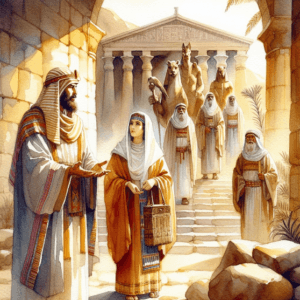 The Egyptians had taken notice of Sarai and her beauty was such that it made its way to Pharaoh.
The Egyptians had taken notice of Sarai and her beauty was such that it made its way to Pharaoh.
In the previous verses, Abram expressed his fear that Sarai’s great beauty would cause the Egyptians to take her from him. Any question that Abram was overestimating Sarai’s beauty is answered in this verse.
The Egyptians did indeed notice how attractive Sarai was. This notice, it seems, will be significant enough that even the rulers of Egypt will hear about her magnificent appearance (Genesis 12:15).
Abram’s plan for them to lie to the Egyptians by saying Sarai was his sister is about to backfire. He may have hoped that, as her “brother,” he would have the right to refuse any marriage proposals.
Certainly, Abram was concerned that a husband would be vulnerable to murderous jealousy, while a brother would not. Of course, things will not work out the way Abram expects.
Rather than solving a problem, Abram’s attempt to out-think God and take matters into his own hands actually causes one of the outcomes he was hoping to avoid!
Genesis 12:15
The princes also of Pharaoh saw her, and commended her before Pharaoh: and the woman was taken into Pharaoh’s house.
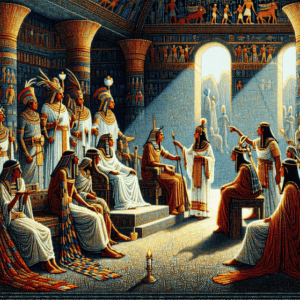 And before Abram knew it, Sarai was sitting in Pharaoh’s house.
And before Abram knew it, Sarai was sitting in Pharaoh’s house.
Abram’s great fear immediately comes to be—in part, because of his own attempts to avoid it. Abram’s plan was for his family tell a half-truth, intended as a whole lie: that Sarai (his wife and half-sister) was merely his sister.
His hope may have been that, as Sarai’s brother, he would have the right to refuse any marriage proposals. At the same time, Abram felt that a beautiful woman’s “brother” would have been less a target for jealous violence than her “husband” (Genesis 12:12).
After Abram, Sarai, and their large company enter Egypt, the princes of Egypt’s Pharaoh report on her great beauty. Pharaoh takes Sarai for his wife—most likely one of many.
Apparently, the Pharaoh didn’t need permission to take a man’s sister for his wife. Ironically, as later verses will show, even the pagan Pharaoh balked at stealing a married woman (Genesis 12:18–19)!
The passage doesn’t reveal whether Pharaoh actually slept with Sarai as his wife or was prevented from doing so by the affliction reported in the following verses.
Given that Egypt’s ruler probably had many wives already, and God’s intentions for Sarai, the most likely situation is that he never had the opportunity to touch her.
Genesis 12:16
And he entreated Abram well for her sake: and he had sheep, and oxen, and he asses, and menservants, and maidservants, and she asses, and camels.
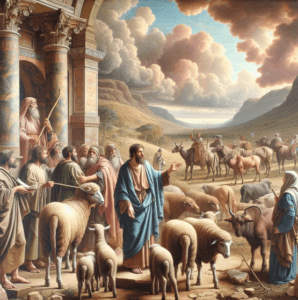 And because they thought Abram was just Sarai’s brother, they ensured he was treated well because of her.
And because they thought Abram was just Sarai’s brother, they ensured he was treated well because of her.
Did you notice the irony?
Abram tells Sarai to lie so that he would be treated well because of her. He meant that he would be able to live and escape with her.
Yet in the end, Scripture records the same phrase in describing how Abram collects this wealth from the sale of his sister.
First, Abram and Sarai lied to protect Abram from any Egyptians who would kill him to take Sarai as their own wife. Perhaps he hoped that as her brother he would be able to refuse any marriage proposals.
The lie came in the form of a half-truth: that Sarai was Abram’s (half) sister. The intent, however, was to make others think she was not Abram’s wife, and this made even a truthful statement into a lie.
This scheme backfired. Instead of approaching Abram to request Sarai’s hand in marriage, or leaving her alone entirely, Pharaoh apparently just took her as his wife, and made some kind of payment to Abram after the fact.
The bride price or honor payment included livestock, work animals, and human servants. Abram’s scheme had increased his wealth, but lost him his wife.
Abram’s fears of losing his wife and his life were justified, but he failed to take those fears to the Lord who had promised to protect and provide for him. He failed to trust the Lord to provide a solution he could not see.
This is a classic example of good intentions being perverted by foolish actions (Job 5:13). Abram’s own godless actions actually instigated what he feared most!
Genesis 12:17
And the LORD plagued Pharaoh and his house with great plagues because of Sarai Abram’s wife.
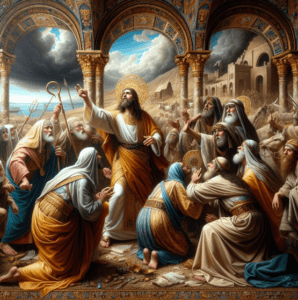 God, you see, was overruling in the lives of Abram and Sarai, but God did not appear to him while he was in the land of Egypt.
God, you see, was overruling in the lives of Abram and Sarai, but God did not appear to him while he was in the land of Egypt.
There are seven categories of material that Abram receives, suggesting that the Lord was at work in blessing Abram despite his sin.
And yet we’ll learn later that one of the female servants Abram receives from Pharaoh was a woman called Hagar. Abram’s sin in Egypt sows the seed of his own future turmoil.
The Jewish Rabbi Rashi declared that the plague was a skin disease that made sexual contact impossible, thus protecting Sarai. And yet the disease didn’t affect Sarai, thus leading Pharaoh to discern that Sarai was the key.
After Abram’s plan to use deception to protect himself fails, the Lord steps in. God had made promises to Abram, and God would not allow Abram’s faithless choice keep Him from keeping those promise.
This, along with the fact that Pharaoh almost certainly had multiple wives, suggests that he never had an opportunity to consummate his marriage to Sarai.
To prevent catastrophe, and to rescue Abram from his own stupid scheming, the Lord afflicts Pharaoh’s household with great plagues or diseases.
Some scholars understand these plagues to be diseases of the skin. The Egyptians, though superstitious people, would have understood correctly that such plagues were a punishment for sin.
Apparently, through this affliction, Pharaoh comes to understand that Sarai is actually Abram’s wife and not merely his sister.
The Bible does not say what process of investigation led to that knowledge. His response to that revelation is found in the following verses.
Genesis 12:18
And Pharaoh called Abram, and said, What is this that thou hast done unto me? why didst thou not tell me that she was thy wife?
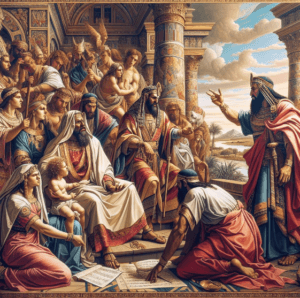 The Pharaoh seems to be a victim here in light of the fact that he knew nothing of the deception. He paid for his bride, But God has made promises to Abram that depend on Sarai remaining Abram’s wife.
The Pharaoh seems to be a victim here in light of the fact that he knew nothing of the deception. He paid for his bride, But God has made promises to Abram that depend on Sarai remaining Abram’s wife.
This led to the conversation with Abram. The Pharaoh chastises Abram for lying and causing this trouble.
Of course the Pharaoh doesn’t say that had Abram told the truth, they would have abducted his wife and killed him. Still, that doesn’t justify Abram’s lie.
Believing Sarai to be Abram’s sister and not his wife, Pharaoh took her as his own wife. In response, the Lord afflicted Pharaoh and his household with plagues, leading to the revelation that Sarai was indeed already married.
Pharaoh is understandably upset with Abram. Not only did Abram withhold the truth that Sarai was his wife, he had received from Pharaoh great gifts of livestock, work animals, and human servants—all while remaining silent about the truth.
Pharaoh summons Abram into his presence and begins to question him harshly. The questions continue in the following verse. Abram, apparently, remains silent once again.
The irony of the situation is enormous. Abram’s half-truth-and-whole-lie actually caused the very outcome he was trying to avoid.
Apparently, even the pagan Pharaoh had enough respect for marriage that he recognized taking a married woman to be a moral crime. Had he known Sarai was Abram’s spouse, or so Pharaoh says in verses 18 and 19, he would not have taken her.
We must notice here that Abram does not act honorably in any way in this episode. The Lord, though, remains faithful to His promise. God intends to accomplish His plan through Abram and Sarai no matter what trouble their foolishness leads them into.
We should, however, take note that later in life, Abram—then called Abraham—will demonstrate exactly the kind of brave, obedient faith which God expects (Genesis 22; Hebrews 11:17–19).
Genesis 12:19
Why saidst thou, She is my sister? so I might have taken her to me to wife: now therefore behold thy wife, take her, and go thy way.
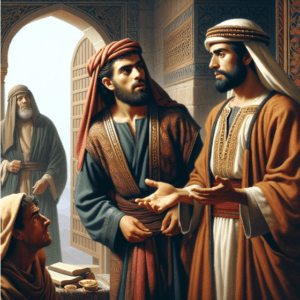 And so God acts to preserve His promise. Since God has said that those who are against Abram would be cursed, here we see that statement proving true. God working to defend Abram from his enemies.
And so God acts to preserve His promise. Since God has said that those who are against Abram would be cursed, here we see that statement proving true. God working to defend Abram from his enemies.
And we also notice God acts to protect Sarai as she obediently obeys and respects her husband even as he makes serious mistakes. He stepped into the ungodly world and had to play by their rules. Bringing one compromise after another.
Pharaoh’s one-sided conversation with Abram ends with this. This and the previous verse record Pharaoh’s three pointed questions: What have you done to me?
Why did you not tell me?
Why?
Pharaoh took with deadly seriousness the Lord’s affliction of his household with plagues. He understood he was guilty of wrongdoing, and he held Abram responsible for putting him in that terrible position.
This makes Abram’s attempt to protect himself all the more ironic. A pagan king recognized the moral crime of taking another man’s wife—but Abram’s deception almost cost him his wife!
It’s not surprising, therefore, that the Bible does not record any meaningful answer from Abram to Pharaoh.
What could he say?
Abram was guilty of causing all of this with his deceptive plan to protect himself from harm instead of trusting the Lord to protect him and Sarai from harm.
Pharaoh concludes by returning Sarai to Abram and telling him to “take her and go.” It’s impossible not to hear the foreshadowing of what will happen between Moses and another Pharaoh many years later.
Again, the Lord will send plagues; again, God’s people will be sent away. Again, God will keep His promises to Abram’s descendants.
Genesis 12:20
And Pharaoh commanded his men concerning him: and they sent him away, and his wife, and all that he had.
 And yet even though Abram was unfaithful, God remains faithful to His promises. Clearly the covenant is working and is in force. Clearly the covenant is unconditional, without dependence on Abram’s behavior.
And yet even though Abram was unfaithful, God remains faithful to His promises. Clearly the covenant is working and is in force. Clearly the covenant is unconditional, without dependence on Abram’s behavior.
After grilling Abram over why he had not told Pharaoh that Sarai was his wife, Pharaoh sends Abram away with Sarai and all the goods Pharaoh has already given to him.
In the end, Abram comes out ahead despite his fearfulness, foolishness, deceptiveness, and silence.
This is not an unintentional aspect of the story of Genesis—God’s use of flawed people, whom He blesses despite their sin, is a crucial point in understanding our relationship to the Lord.
It is becoming clear that God’s promise to Abram is completely one-sided. No matter what Abram does, God will keep His promise to bless Abram, to protect him, and to make him and his offspring into a great nation.
Abram won’t earn it; God will give it. Over time, Abram will learn to trust God. His obedience with his son, Isaac, after being renamed Abraham (Genesis 22), will become a key example of godly faith in the face of doubt and danger (Hebrews 11:17–19).
I hope that you have really enjoyed this post,
Please Leave All Comments in the Comment Box Below ↓

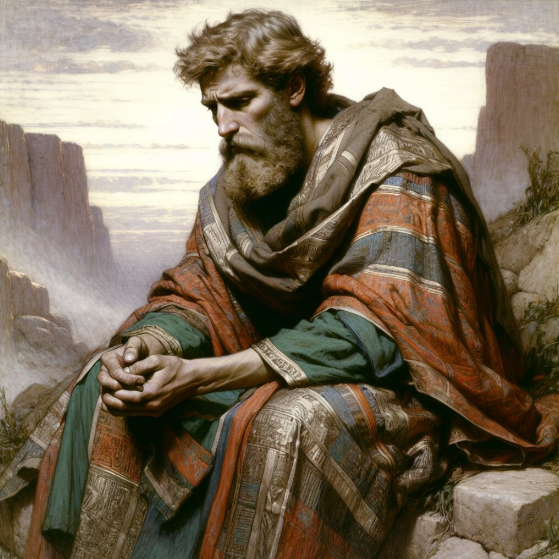











The article delves into the story of Abraham, a significant figure in various religious traditions, and explores a moment of doubt and lapse in his faith.
It highlights the relatability of Abraham’s struggles and how they can serve as lessons for us all.
What struck me about the article was its emphasis on the complexities of faith and the inherent challenges we face along our spiritual paths. It recognized that even the most devoted individuals can experience doubts, uncertainties, and lapses in their faith, and that it is a natural part of the human experience.
The author skillfully analyzed the story of Abraham, shedding light on the reasons behind his moment of doubt and the lessons we can glean from it. It prompted me to reflect on my own journey of faith and the moments where I may have encountered similar struggles.
Moreover, the article encouraged me to view lapses in faith not as failures, but as opportunities for growth and a deeper understanding of our beliefs. It reminded me that questioning and wrestling with our faith can lead to a more authentic and resilient spiritual foundation.
Overall, “Abraham’s Lapse of Faith” is a thought-provoking and introspective article that explores the complexities of faith and the lessons we can learn from the struggles of historical figures like Abraham. It offers reassurance to those who may have experienced doubts or lapses in their faith, reminding us that these moments can ultimately strengthen our spiritual journey.
I highly recommend this article to anyone seeking a deeper understanding of the human experience and the dynamics of faith.
Hello again Steve,
I continue to hope that all is well with you.
Thank you for considering this episode as one which highlights the relatability of Abraham’s struggles and how they can serve as lessons for us all, and for pointing out the emphasis on the complexities of faith and the inherent challenges we face along our spiritual paths.
Your continued participation and interest in the HBS & DwJ website is greatly appreciated. It is a real pleasure to continue having returning educational and inspirational visitors such as yourself. Your comments continue to add value to the information already provided.
Thank you so much for continuing to comment, as well as your continuous input on each episode.
Blessings My Friend!
Wow, Abram’s journey to Egypt is quite a fascinating story!
It’s interesting how he decided to go to Egypt during the famine without seeking God’s input. Sometimes we can be tempted to make decisions based on our own reasoning rather than relying on God’s guidance. But it’s amazing to see how God still protected Abram and his wife Sarai, even in the midst of their flawed decision-making.
I couldn’t help but think about how often we, as Christians, can be drawn towards the world and rationalize our actions. Just like Abram, we may come up with reasons that seem valid to us, but deep down, we know that we are compromising our faith. It’s a reminder for us to always seek God’s guidance and trust in His promises, even when the world seems more appealing.
Have you ever found yourself rationalizing your actions or decisions, even though you knew deep down it wasn’t aligned with God’s will?
How did you navigate through that situation?
Hello again Israel,
Thanks for taking the time to stop by and comment on another HBS & DwJ Podcast episode.
Yes, there have been times where I have found myself rationalizing my actions or decisions, even though I knew deep down inside that it wasn’t aligned with God’s will.
There have been choices I made against GOD’s Will and paid a dearly price for them, which in turn, after struggles through different situations, I have come to realize that I Must pray to GOD for guidance and strength to work through All situations.
Thank you for your continued support with helping HBS & DwJ spread GOD’s Word.
Blessings Unto You My Friend!
Hey Jerry,
Very interesting article you have written here and there are lessons contained in these quoted passages that help Christians to stay in the middle of God’s Will, even today, all these years after these events took place.
I do find it helpful to see the man that God chose to be the father to all those who believe. Not only ancient Israel, but also to those of the household of faith in Jesus Christ.
Because this was not the only time that he may have tried to accomplish things in his own time rather than waiting on the Lord’s timing, such as when he went in to his concubine when he became impatient for the Lord’s timing in providing him a son.
Hello Joseph,
Welcome to the HBS & DwJ Platform, and thanks for taking the time to stop by and comment on this HBS & DwJ Podcast episode, as well as considering it interesting.
Feel free to listen to the HBS & DwJ Podcast on iHeart, Apple Podcast, YouTube, or where-ever you get your podcast.
Blessings To You, As Well My Friend!
Wow, this article about Abraham’s lapse of faith and his journey to Egypt is really fascinating.
It’s quite an intricate story with a lot of moral and spiritual implications. As someone who’s not very familiar with the Bible, I find the context and explanations you’ve provided really helpful in understanding the story better.
One question I have is about the significance of Egypt in this story. You mentioned that in the Bible, Egypt is often seen as a representation of the world.
Could you help me understand why Egypt holds this symbolic meaning and how it relates to Abram’s decision to go there during the famine?
It’s interesting to think about how his choice to go to Egypt might have broader implications beyond just escaping the famine.
Also, I noticed that despite Abram’s lapse of faith and his deception about Sarai being his sister, God still intervenes to protect Sarai and upholds His promises. This seems like a complex interplay between human actions and divine intervention.
Could you elaborate a bit more on the theological aspects of this story?
How does Abram’s behavior and God’s response fit into the larger themes of faith and divine providence in the Bible?
Hello again skamalka,
Thanks for continuing to stop by the HBS & DwJ website.
Situated in the northeast corner of Africa, Egypt connects to the Holy Land via the Sinai Peninsula. In Bible times, the life-source of Egypt was the Nile River, which provided the area’s only supply of water for drinking and irrigation.
At the end of the rainy season, the river would swell and flood the Nile Valley, carrying nutrient-rich silt to replenish the valley’s fertility. The main crops produced in the region were barley, spelt, beans, lentils, cucumbers, onions, grapes, and figs.
Egypt appears first in the biblical narrative in the story of Abraham when a severe famine struck Canaan, causing the patriarch and his family to sojourn in Egypt (Genesis 12:10–20).
Egypt has a tremendous symbolic significance in the Bible. Israel’s redemption from Egypt is a picture of our deliverance from sin and death.
God’s response showed what he thought of Abraham’s plan. By plaguing Pharaoh and rescuing Abraham and Sarah himself, he demonstrated that he always had the siutuation under control.
There was never a need for Abraham to extemporize. Instead, he needed to stay on-script and trust that God had his safety in hand.
Blessings My Friend!
This insightful article sheds light on Abraham’s lapse of faith, highlighting the human tendency to rationalize and make decisions contrary to divine guidance.
The narrative of Abram’s journey to Egypt serves as a timeless reminder of the challenges we face when our trust in God wavers, and the unintended consequences that can arise from our misguided attempts to safeguard ourselves.
It’s a thought-provoking reflection on the delicate balance between faith and human frailty, encouraging readers to examine their own moments of doubt and the importance of relying on divine wisdom.
Hello again Ashley,
Thank you for your continued support, reading and commenting on these HBS & DwJ Podcast episodes.
Thanks for considering Abraham’s Lapse Of Faith – Abram Didn’t Believe GOD to be an insightful, thought-provoking reflection on the delicate balance between faith and human frailty.
It is always a pleasure to recieve visits from you. Looking forward to your return.
Blessings My Friend!